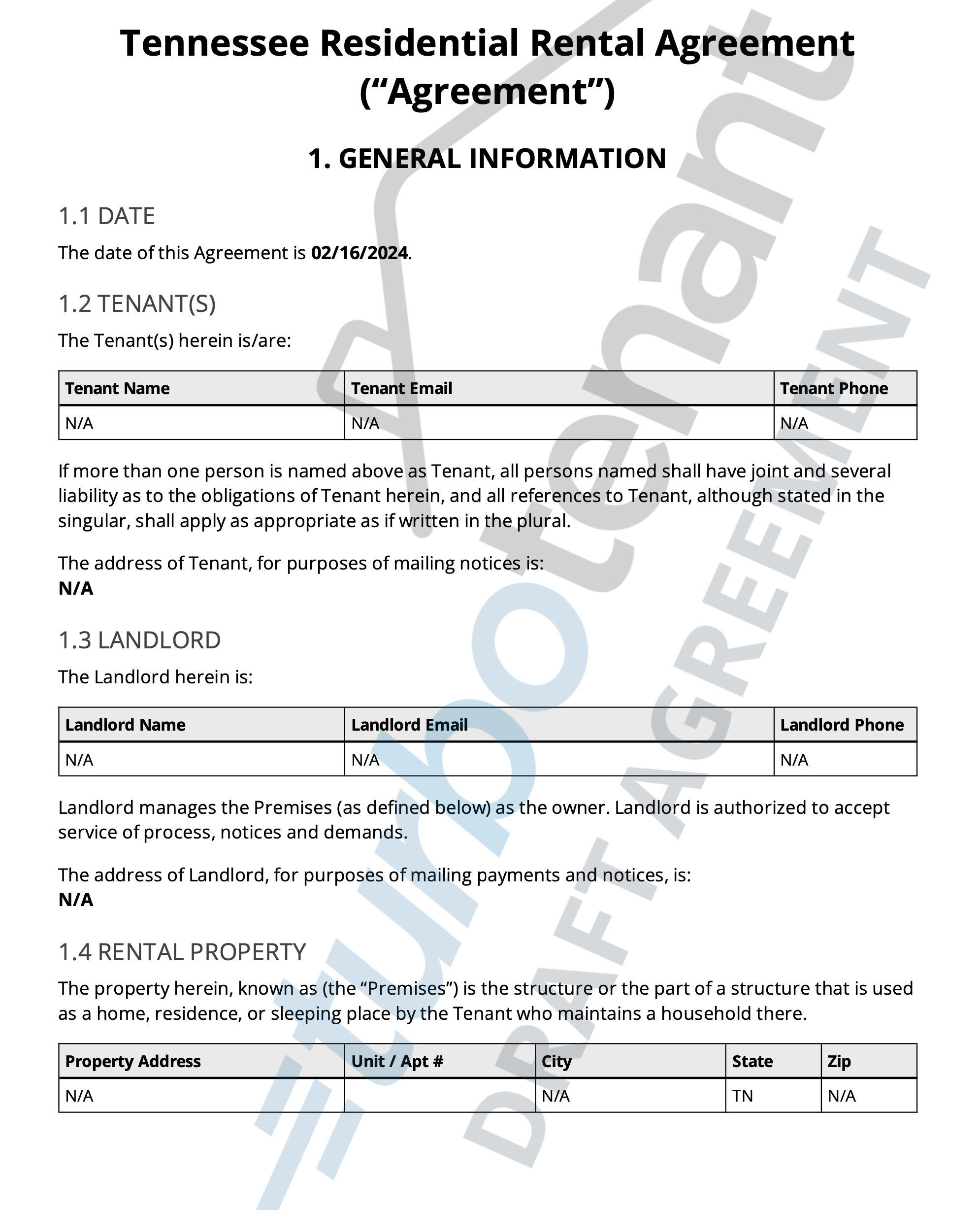
Tennessee lease agreements are essential tools for landlords to establish the terms and conditions under which a rental property is let to tenants. These agreements are designed to be comprehensive, covering everything from rent payments to property maintenance, ensuring both parties are protected under Tennessee law. TurboTenant’s Lease Agreement Generator and Templates provide a streamlined way for Tennessee landlords to create lease agreements that are not only compliant with state-specific regulations but also easy to understand for all parties involved.
Section 1 – Custom to You
The lease creation process begins with the customization of the agreement to fit the specifics of the rental arrangement. This includes details such as the identities of the landlord and tenant(s), the rent amount, utility responsibilities, and more. A summary table at the front of the lease agreement helps to highlight these main details for easy reference.
Key Customization Options
- Additional Provisions: This section allows landlords to include any property-specific rules, necessary local clauses, or other specifics. It’s recommended to review any such additions with a legal professional to ensure compliance.
- Lost Key Policy: In the event that tenants do not return all keys upon moving out, they are required to cover the full cost of rekeying the property. This ensures security for the next tenants and maintains the integrity of the property.
Section 2 – Specific to Tennessee
Certain clauses within the lease agreement are tailored specifically to Tennessee’s legal requirements, ensuring landlords stay compliant with local laws. These sections are fixed to avoid any unintentional non-compliance.
Important Tennessee-Specific Clauses
- Late Fees (Section 2.1): In Tennessee, if rent is not paid in full by 5:00 pm on the 5th day of the month, landlords are entitled to charge a late fee of 10% of the unpaid rent amount.
- Security Deposit Provisions (Section 2.4): While there is no state statutory maximum for security deposits in Tennessee, landlords must disclose the banking details where the deposit is held and keep it separate from personal funds. The security deposit must be returned within 30 days after the tenant vacates the premises, assuming all conditions are met.
Section 3 – General Clauses for Best Practices
In addition to the state-specific provisions, the agreement includes general clauses that align with best practices in landlord-tenant relations. These include policies on subletting, property alterations, legal compliance, and more.
General Best Practice Clauses
- Subletting (Section 3.1): Tenants are not permitted to sublease the rental property without the landlord’s written consent, maintaining control over who resides in the property.
- Altering or Improving the Property (Section 3.2): Tenants must obtain written consent from the landlord before making any alterations or improvements to the property, ensuring it is returned in its original condition.
- Choice of Law (Section 3.11): The lease agreement is governed by Tennessee law, with any disputes to be resolved in the county courts where the property is located, providing a clear legal framework for the agreement.
- Follow the Law (Section 3.14): Tenants must adhere to all federal, state, and local laws and ordinances while occupying the property, ensuring a peaceful and lawful tenancy.

FAQ
What can I charge for a late fee in Tennessee?
In Tennessee, landlords can charge a late fee of 10% of the unpaid rent amount if rent is not paid in full by 5:00 pm on the 5th day of the month.
Is there a maximum security deposit amount in Tennessee?
Tennessee does not have a state statutory maximum for security deposits. However, landlords must keep the deposit in a separate banking account, provide details where the bank is located and return it within 30 days of tenancy termination, assuming all conditions are met.
Can tenants sublease the property?
Tenants are not allowed to sublease the property without the landlord’s written permission, ensuring the landlord retains control over the occupancy of the property.
Are there any specific disclosures required in Tennessee lease agreements?
While this document does not detail specific disclosures beyond security deposits and late fees, Tennessee law may require additional disclosures depending on the property’s condition and location. Landlords should consult with a legal professional to ensure all necessary disclosures are included in the lease agreement.
TurboTenant Tennessee Lease Agreements
TurboTenant offers Tennessee landlords a valuable resource for creating lease agreements that are both compliant with state laws and reflective of best practices in property management. With customizable templates and state-specific clauses, landlords can confidently enter into leasing arrangements that protect their interests and provide clear guidelines for tenants. For any unique or additional provisions, consulting with a legal professional is advisable to ensure full compliance and protection.
By leveraging TurboTenant’s tools, landlords can streamline the lease creation process, ensuring a smooth and legally sound start to their landlord-tenant relationship in Tennessee.
Tennessee Resources


